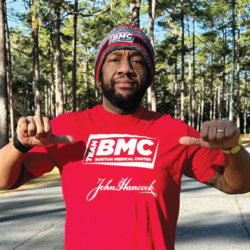Frederick Powell was an anesthesiology resident at Boston Medical Center and no stranger to the operating room. However, on April 15, 2013, Powell had his experience put to the test in ways that few residents could fathom—responding to the Boston Marathon bombing.
What began as a regular shift quickly became anything but ordinary. “I remember we were inundated with patients—it was all hands on deck in the ER,” says Powell. “It was incredibly stressful, but these patients needed us.”
BMC received 23 patients in the aftermath of the bombing. Not only was the volume of critical procedures much higher than an average day, but the pace of getting patients to the operating room was lightning fast because it needed to be—every seco nd counted. In many cases, patients were moving from ER to OR in as little as an hour.
nd counted. In many cases, patients were moving from ER to OR in as little as an hour.
“We always talk about emergency preparedness, but it really came to light that day,” says Powell. “Being at the hospital and seeing how everyone came together, it was one of my proudest days of being a resident at BMC.”
Yet, a personal challenge was still to come. Two years later, Powell was a chief resident, just months away from completing his training and starting a critical care fellowship. One evening as he was about to head to BMC, Powell wasn’t feeling well. Instead, he notified his supervisor and went to the BMC emergency room, this time as a patient.
Powell, just 33 years old, was having a heart attack. To make matters worse, it was in a part of his heart that cardiologists couldn’t operate on. He was placed on powerful blood thinners and admitted to the ICU, where he would spend the next 20 days. “It was scary, but it was also embarrassing. I was used to caring for others, and now here I am one of the sickest patients in the hospital and needing care myself.”
After spending 11 days in cardiac rehab, he developed Dressler syndrome, a condition causing inflammation around the heart. After an additional nine days of treatment, Powell was finally discharged, but sadly, had to defer his fellowship.
“During that time, I found myself asking ‘why me?’ I’ve been taking care of all these patients, I thought I had put enough in the savings bank of ‘doing good’ that this shouldn’t be happening to me. But it did happen, and it ultimately motivated me.”
—Frederick Powell, former BMC resident and 2023 Team BMC Boston Marathoner
“During that time, I found myself asking ‘why me?'” Powell says. “I’ve been taking care of all these patients, I thought I had put enough in the savings bank of ‘doing good’ that this shouldn’t be happening to me. But it did happen, and it ultimately motivated me.”
Powell went on to complete his fellowship and took a job as an anesthesiologist in Georgia, where he lives today with his wife. Along the way, he picked up running, and health and fitness became an important part of his life.
Driven by his experience responding to the Boston Marathon bombing and advancing his fitness journey, Powell is set to tackle the 2023 Boston Marathon as a member of Team BMC on April 17. Powell, along with his 80 team members from 11 states and three countries, is training and raising funds to support pioneering programs and leading departments—including best-in-class emergency medicine.
For Powell, this is about much more than conquering his first marathon. Running as a member of Team BMC is a chance to give back to an organization that is near and dear to his heart—both as a provider and as a patient. “It’s because of the excellent care that I received at BMC that I’m still here today,” Powell says.
Make a gift in honor of BMC’s efforts during the 2013 marathon bombing >